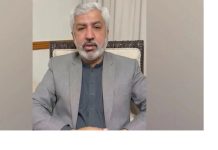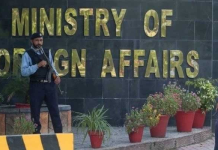ISLAMABAD: The education ministry and Google announced a “strategic collaboration” to improve access to education and support the development of a digital ecosystem for learning, wa ith the agreement also aimed at reducing the number of out-of-school children across the country.
This was announced by Google for Education and the Ministry of Federal Education on Thursday during an event, according to a statement.
Google, through its Google for Education’s country partner, Tech Valley, will work with the government to establish a local assembly of over 500,000 Chromebooks by 2026. It will also provide access to digital tools and resources for students and teachers, train teachers on how to use technology effectively in the classroom, and will develop and implement innovative learning programmes that leverage technology.
According to a statement, the collaboration will focus on helping out-of-school children in Pakistan. Last month, Prime Minister Shehbaz Sharif declared an “education emergency” to address the issue of over 26 million children who are out of school. He pledged to oversee a national programme to enroll these children back into educational institutions and expressed his hope for the provincial governments’ support in achieving the goal.
Plan also includes local assembly of over 500,000 Chromebooks
As part of the collaboration, Allied, an Australian manufacturer of Google Chromebooks, will establish an assembly line in Pakistan to locally assemble Google Chromebooks, making them more affordable for educational purposes. The goal is to ensure that every student in the country has access to cutting-edge classroom technology, which will enhance their learning experience.
Ultimately, Google’s collaboration with the Ministry of Education aims to drive a large-scale digital transformation of Pakistan’s education system, creating smart classrooms and fostering a healthy learning ecosystem. Both partners will work together to empower educators and students, focusing on upskilling, training, and building flexible smart classrooms.
Shehbaz Sharif also emphasised the need for such initiatives and said, “The work Google has been doing in the education sector is highly commendable, and we are here to support its efforts in Pakistan.” He also expressed a strong interest in expanding the collaboration between Google and the federal government and requested the Ministry of Federal Education and the Ministry of IT and Telecom to work closely to identify mutually beneficial synergies.
Education Minister Dr Khalid Maqbool Siddiqui said, “The partnership with Google for Education is a significant step forward in our efforts to provide quality education to all children in Pakistan. We believe that technology can play a vital role in improving learning outcomes and preparing our students for the future.”
Farhan S. Qureshi, Google Pakistan’s country director, said: “This partnership has the potential to transform education in Pakistan for the better, giving millions of students access to education and digital tools that will help them learn better and get ready for the digital economy. Also, creating a local assembly of over 500,000 Chromebooks will help Pakistan’s manufacturing industry grow and attract more investments in technology.”
Kevin Kells, the managing director at Google for Education, said: “Google for Education offers powerful tools that can support learners in developing some of the key skills they need to thrive; including foundational literacy and cutting edge digital and AI skills. We are proud to be able to support the government’s mission and help to safely connect Pakistani young people — including out-of-school children — to high-quality learning opportunities. Moreover, Google Classroom and Workspace for Education will help teachers have the maximum impact on their students.”
















